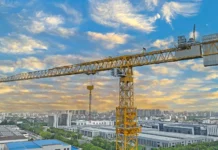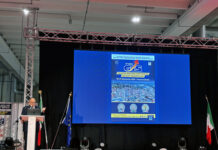Continental has announced that it will be taking a more active role in the area of fleet management systems for the construction industry – with a special focus on digitalization and telematics.
Over the mid-term, the technology company will be able to offer fleet operators and construction companies worldwide a fleet management system that is brand-independent and is based on products the company is offering today. In addition, Continental will be offering vehicle and machine manufacturers more micro-services based on fleet management information. It can also partner with customers to develop a complete telematics ecosystem. Continental experts believe that this will allow the industry to leverage tremendous efficiency potential that has lain dormant so far.
Today, a full 95 per cent of all construction projects take too long or are too expensive according to the McKinsey report “Reinventing Construction.” Along with external reasons, this is also due to insufficient information being available in real time, e.g., on the status or utilization of vehicles. In this context, Mario Branco, Head of Business Development for Off-Highway Applications at Continental, names three significant advantages that companies with digital fleet management have over the competition: better utilization, lower maintenance costs and more reliable planning. “Those who work with us on telematics and fleet management can utilize equipment better, reduce maintenance costs and coordinate job assignments optimally.
Merging the data of connected machines and vehicles in one system enables companies to reliably plan costs and timeframes at the construction site and avoid expensive delays,” says Branco. “Experience in the commercial vehicles sector has shown us that professional fleet management offers precisely this transparency in real time.”
Hardware and software, on- and off-highway: Continental combines competencies
The foundation for the new products and services: Continental is bringing together all of the necessary competencies – from telematics and fleet and tire management to intelligent transport systems, connectivity and smart rubber components to cyber security – and it can make use of a comprehensive product portfolio. The company offers both hardware components and software know-how and already today connects on- and off-highway vehicles with cloud systems. Taken as a whole, Continental is one of the world’s biggest players when it comes to telematics for cars and vehicles. At bauma Continental experts will show, among other hardware devices, a telematics platform that is designed according to off-highway requirements and ready for upgrading to 5G communications technology.
Best practice from the commercial vehicle world
An example from the commercial vehicle world illustrates how collaboration with the manufacturers of construction equipment and vehicles might look. Recently, Continental partnered with the Chinese commercial vehicle manufacturer FAW JF to develop a complete telematics ecosystem. The platform is intended to offer functionalities which optimize overall operating costs, improve customer service and boost the efficiency of logistics processes. Here, Continental is introducing the competence of its internal telematics expert Zonar from Seattle. The fact that Zonar already offers various fleet management services – including for construction equipment manufacturers – gives Continental an advantageous starting point for supporting the industry even better in the future. Precisely tailored functionalities have been established together with OEMs which interconnect construction equipment and vehicles and enable micro-services. An example is the Electronic Verified Inspection Reporting app (EVIR) from Zonar, which assures standard-compliant execution of inspections before and after drives and which will be on display in a new version at bauma. This is where experience with telematics data also comes into play. But Continental is not only relying on Zonar. It has been developing telematics solutions and digital tachographs under its VDO brand for many years now. It also has considerable expertise in secure handling of data from its tachographs business and from the recently acquired company Argus, which specializes in cyber security. Continental will make all this knowledge available to the construction industry as well.
New standard opens door to manufacturer-independent systems
At the same time, based on its competencies in the telematics business in Asia, North America and Europe, Continental wants to develop a comprehensive fleet management system for fleet operators and construction management businesses in which they can simulate their entire fleets of equipment – independent of the brands or types of vehicles. A view of real-time data of all assets at a glance will allow fleet managers to operate their fleets as efficiently as possible. This requires that the system must contain and evaluate as much information as possible and at the same time ensure that the responsible managers gain a clear picture. Therefore, Continental will integrate numerous solutions from its own portfolio into the new system.
Nonetheless, comprehensive data and evaluations of machines and vehicles represent just one step towards more efficiency in fleet operation in the construction industry. “For operators, it is of immense importance to have a single interface for their mixed fleets. However, the systems available so far have always been closed, always manufacturer-specific. A lot of potential is lost because of this situation,” says Branco. However, the new AEMP telematics standard is now changing requirements. The ISO 15143-3 standardizes 20 data points for exchanging the data of construction machines – and thereby enables manufacturer-independent fleet management systems. The data points range from positional data and operating hours to fuel consumption and the display of warning lamps in instrument clusters. Zonar is already implementing the new standard in its systems, and first pilot projects have begun in North America.
“Today, users in North America can already optimize utilization planning for their machines, track progress at the construction site, report on machine availability and document processes with our fleet management system,” says Ian McKerlich, President of Zonar. “This means that we are making a significant contribution toward the digitalization and efficiency of construction sites. Now we want to roll out the system worldwide in alliance with our Continental colleagues in other regions.”
Continental will be presenting a solution for on-board weighing that shows the actual total load as well as the pressure on every single axle. This information can then be made available to the driver via a display and can also be transmitted via the cloud to a business analysis or fleet management tool. The system is based on a strain gauge sensor, mounted on the axle, which determines the load very precisely
The system can be retrofitted, and manufacturers have also started to test it. In addition, a new photovoltaic solution with flexible solar modules can be used to deliver sustainable energy to cover the higher energy needs for telematics applications and to protect the batteries of construction machines in their deactivated state. The solution from Continental can cover from 10 to 20 percent of daily energy usage, depending on the vehicle type, location of use and ambient temperature.
Continental develops pioneering technologies and services for sustainable and connected mobility of people and their goods. Founded in 1871, the technology company offers safe, efficient, intelligent, and affordable solutions for vehicles, machines, traffic, and transportation. In 2018, Continental generated preliminary sales of €44.4 billion and currently employs around 244,000 people in 60 countries and markets.






![[Job Story] Spanish Construction Company Adopts Bobcat Machine IQ Telematics System](https://www.heavyquipmag.com/wp-content/uploads/2024/11/Jocar-6-218x150.jpg)





 Copyright 2017-2023 All rights reserved.
Copyright 2017-2023 All rights reserved.